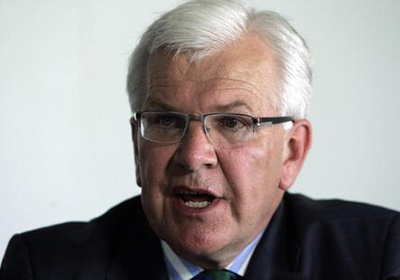Howard rejected because he would foil ICC’s saboteurs, claims Malcom Speed
July 1, 2010 03:19 pm
Writing a column for Australia’s Sydney Morning Herald, former Chief Executive of the ICC Malcolm Speed claims that the reasons behind John Howard’s rejection for the top post in the ICC are not what it is outwardly portrayed.
The decision of the ICC members to reject the nomination of John Howard by the cricket boards of Australia and New Zealand for the International Cricket Council presidency is a disgrace and an insult to both countries. Rest assured, he was not rejected because of his lack of experience as a cricket administrator, his strong opposition to Robert Mugabe’s disastrous regime in Zimbabwe or his outspoken views about Muttiah Muralitharan’s controversial bowling action. There is more to it than that, says Speed.
To put his position into context, Howard did not seek this role. Cricket Australia approached him and asked him to agree to his name being put forward as the joint nominee from Australia and New Zealand under a system that provides for the top position in world cricket to be rotated around the major countries. Unlike many other former PMs and premiers, Howard has not gone down the path of the corporate board. He was genuinely interested in doing this job.
Cricket is his passion and he thought he could bring new attributes, wisdom and experience to the position and to the game. He would have had two years as vice-president to learn the ropes before he became president. He was prepared to work full-time in the role.
The rejection is a symptom of the wider malaise that afflicts world cricket and its dysfunctional governing body. The current system of rotating the ICC presidency is the fourth such system to have been introduced and failed since 1995.
Under previous rotation systems, Australia and New Zealand have accepted nominations from other countries for the presidency when they clearly had strong reservations about the candidates. They expected the same respect for their candidate and they did not get it. Instead they and Howard were insulted.
Howard has been rejected because his appointment would provide ICC with strong leadership that would thwart the ambitions of several current administrators to downgrade and devalue the role of the ICC. Howard would have stood in their path. The role requires strength of character - a leader, diplomat, statesman and politician. The ICC board is as political as any political party. The countries that voted him down want a compliant figurehead who will do their bidding.
The man who is to be the next ICC president, Sharad Pawar, is the Minister for Agriculture in the Indian government - a serious full-time job, feeding 1.2 billion people. He is a good and fair man but he will be working part-time as ICC president and, take it from me, he knows little about cricket administration. I was present at several ICC board meetings he attended. ICC meetings generally last two days. Pawar attended for one hour and was then replaced by one of the Board of Control for Cricket in India apparatchiks. They were concerned that he was too busy and would be too reasonable.
So where to now? Cricket Australia and New Zealand Cricket should refuse to put forward another nominee. Under the rotation system, it is then the turn of Pakistan and Bangladesh.
The Pakistan Cricket Board chairman is a nominee of the president of the country - a political appointment. The incumbent is a buffoon and cricket in Pakistan is a basket case. Similarly, the president of the Bangladesh Cricket Board is a nominee of the prime minister. Two of the BCB cricket presidents during my time with ICC, ended up in jail when there was a change of government. The last BCB president I encountered was an army general. He did not know the name of the Bangladesh captain, the team’s next opponents and the capacity of the new ground that had just been inaugurated in Dhaka. I was too polite to ask him whether he had ever been to a cricket match!
When these two countries come forward with their joint nominee, Australia and New Zealand should politely refrain from voting. In the meantime, they should be banging the table and making their displeasure widely known. To conclude, let me make a prediction. The ICC head office moved from London to Dubai in 2005. Howard’s rejection is a clear sign that the ICC will be based in Mumbai by 2012.
(Malcolm Speed was the Chief Executive of the ICC from 2001 to 2008)












